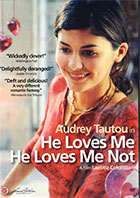
He Loves Me . . . He Loves Me Not (original French title: À la folie . . . pas du tout) 2002
Distributed by First Run Features, 630 Ninth Avenue, Suite 1213, New York, NY 10036; 212-243-0600
Produced by Charles Gassot (Téléma SAS); TF1 Films Production; and TPS Cinema
Directed by Laetitia Colombani
DVD , color, 96 min.
High School - General Adult
Delusions, Mental Illness
Date Entered: 07/10/2015
Reviewed by Gary D. Byrd, University at Buffalo (SUNY)Although this film has been marketed, reviewed and can be enjoyed as a romantic comedy-drama with “devious” thriller elements, it can also be viewed as a rather serious and objective look at a very specific kind of mental illness: that is, the rare, but well described, “delusional disorder of the erotomanic type” (see the Diagnostic and Statistical Manual of Mental Disorders, 5th edition, 2013). The story centers on a young woman named Angelique (played very effectively by Audrey Tautou), who, though otherwise very normal in her relationships with friends and at work, is convinced that a happily-married young doctor, Loic Le Garrec (also played competently by Samuel Le Bihan), living in a house next to hers, is pursuing her romantically.
Viewed as a comic drama and thriller, the dramatic thrust and comic elements of the plot are both cleverly enhanced through the device of presenting the story in the first half of the film from the perspective of Angelique and then almost literally rewinding the film to present the same events in the second half of the film from the perspective of Loic. Thus, we are first drawn into Angelique’s distorted romantic point of view and find ourselves laughing at, and sometimes even sharing, her frustration and anger with Loic’s actions. Then, in the second half of the film, the story takes on more of the elements of a thriller as we gradually, along with Loic, come to understand the full extent of Angelique’s delusion.
Twenty-six years old when the film was released, this was Paris-based Laetitia Colombani’s first feature-length project as both director and writer. To date, she has written and directed six films including four shorts and another feature film (My Stars or La psy-chat-nalyste, 2008) and she has acted in 15 films, mostly shorts. A U-Tube interview with her shortly after the release of this film, makes clear that Colombani wanted to both entertain and educate audiences with a clinically accurate portrayal of this rare delusional disorder. Viewed as an educational case study of erotomania, the film accurately presents all of the key diagnostic elements of this delusional disorder:
- The individual is convinced another person (usually of a higher status and often a complete stranger) is in love with him or her.
- Efforts to contact this other person are common.
- The individual does not suffer from strong hallucinations but, if any are present, they are directly related to the delusion.
- The individual’s functioning is not markedly impaired or obviously bizarre.
- Any manic or depressive episodes are brief.
- The delusion is not attributable to the physiologic effects of a drug or other substance.
Unfortunately, the combination of international marketing, an internationally-famous, comic lead actress (Tautou gained international fame the year before this film was released as the comic star of Amelie, 2001), and the English version of the title have together led many reviewers to interpret the film as simply a romantic comedy with a bizarre thriller twist. He Loves Me . . . He Loves Me Not, as the title, strongly implies a romantic comedy plot, but the French title (À la folie . . . pas du tout) suggests instead that, rather than being madly in love (the full French phrase is: Je t’aime à la folie, or “I’m madly in love with you”), Angelique is really not at all (“pas du tout”) in love, but actually a bit “mad.”
The film is certainly very entertaining and appropriate for general audiences of teenagers and young adults who will enjoy the romantic confusions of the plot and the “thriller” elements in the second half. Nevertheless, with an appropriate introduction by a mental health professional, this film can be viewed by college, university or health care professional audiences as a mostly-realistic case study of the problems and behaviors associated with this rare delusional disorder.